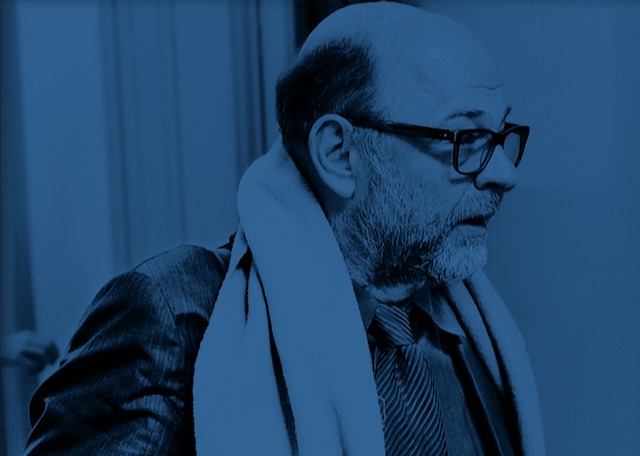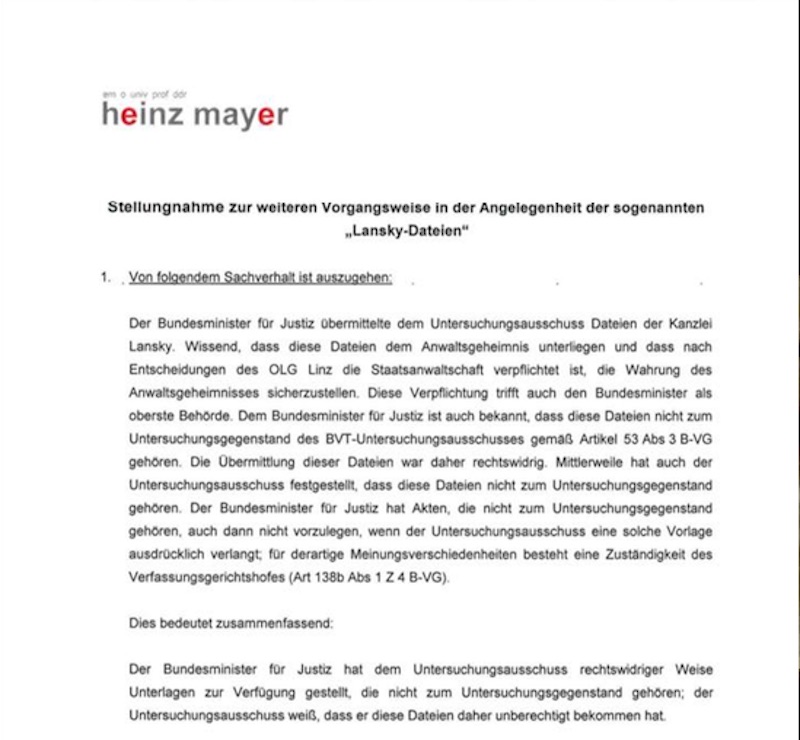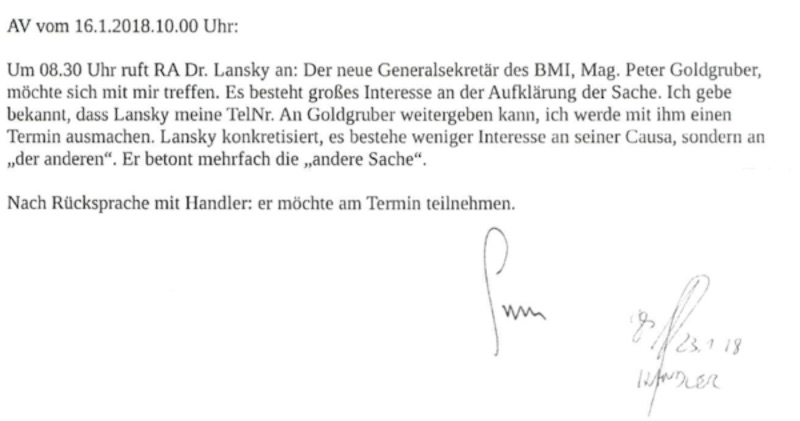Get the weekly SPARTANAT newsletter.
Your bonus: the free E-Book from SPARTANAT.

Lawyer Gabriel Lansky has a network that reaches not only into top politics and the judiciary. He is also a member of the Freemasons, a notoriously secretive circle. Lansky kept silent in the BVT investigative committee. However, he significantly contributed to the scandal surrounding the Federal Office for the Protection of the Constitution (BVT). ADDENDUM investigates the roots of the struggle for the Austrian domestic intelligence service.
Vienna, Rauhensteingasse. Gabriel Lansky and Herbert Anderl may not necessarily be kindred spirits. However, they are lodge brothers. One, one of the most famous lawyers in the country, sits with the other, until 2013 responsible as General Director for public security in Austria, in a secret lodge in Vienna's city center, where influential men spiritually come together. Sometimes they even hold hands. This ritual is called the chain of brothers, which unites them. Privately. And professionally. Even though the men like to deny this because "business freemasonry" - the gaining of economic advantages from membership - is strictly taboo according to centuries-old rules.
Half a Million Emails
In months of research, ADDENDUM dealt with the Grand Lodge of Austria (GLvÖ), an umbrella organization of Austrian Freemasons, their traditions, statutes, and manners. And also with one of their key figures: Brother Gabriel, last name: Lansky. The lawyer is 62 years old, founder and majority owner of a major law firm in Vienna. In the past, Gabriel Lansky also made a name for himself as a human rights lawyer. Now, he is fighting for himself, for his life's work, which he sees threatened by the half a million emails that are available to the BVT investigative committee and are at risk of being made public. This is uncomfortable for a lawyer who prefers to act behind the scenes.
Gabriel Lansky somehow has to blame himself for the current wildfire. The emails come from him, from his law firm, from his server. The involvement of the law firm in the Aliyev case - the former ambassador and former son-in-law of the Kazakh president, for whom Lansky orchestrated lobbying, was found dead in his cell in 2015 - is also the reason why the data came into circulation. Lansky had been accused, among other things, of intelligence activities harmful to Austria. The BVT investigated, but the public prosecutor's office dropped the case. Nevertheless, some of the data is said to have still been available within the BVT.
The data is also available to the BVT investigative committee factions because Lansky already initiated legal action against the intelligence service in the summer of 2017. His suspicion: BVT officials were improperly hoarding insider knowledge and therefore also emails from his law firm.
Could these around 500,000 emails now reveal a system? Could they contain not only law firm gossip, but also advice to oligarchs, support for parties, and - for example - support for a former government member?
The Aliyev Case
At this point, a closer look back is worthwhile: In autumn 2010, Gabriel Lansky himself orchestrated a case that was particularly important to him and his law firm: with the active support of former Federal Chancellor Alfred Gusenbauer and other international ex-politicians advising Kazakhstan, he fought on the side of the Kazakh president against his former son-in-law Rachat Aliyev, who had settled in Austria and apparently felt safer here than in his homeland. Officially, the law firm represented a Kazakh victim association. The fee: in the millions. The goal: to bring Aliyev back as quickly as possible to face trial in his former homeland.
The Unwelcome Investigators
Coincidence or not: At that time, in autumn 2010, the Lansky law firm apparently caught the attention of two - from their point of view - unwelcome Austrian investigators: One, Colonel J., worked at the Federal Criminal Police Office, the other, Chief Inspector B., worked at the BVT. Both had dealt closely with the Kazakh secret service. And both, in a way, had a higher authority in the Ministry of the Interior: Herbert Anderl, the General Director for public security.
What did Lansky do? After hearing about a complaint against the two investigators, he filed a motion of recusal. What did Anderl do? He brought the case to light, declared the matter a "closed case" and asked the two detectives' superiors to report to him about it.
Especially revealing is the subsequent conversation between the General Director for public security, Anderl, and the then most famous chief investigator at the Federal Criminal Police Office: Department Head Ernst Geiger, who was the immediate supervisor of Colonel J. at the time.
The Questions of the Lodge Brother
In October 2010, Anderl requested a statement that he received from Ernst Geiger on October 21. Apparently, transferring the case to a State Criminal Police Office is under consideration. Hofrat Geiger stated that the "statements made by Colonel J." were, in his opinion, "comprehensible and credible. The grounds for recusal do not seem to be present to me, but the stiffening in the process and the constant scolding of the investigators make further successful investigative work difficult with these officers. Due to the complexity of the case and its international dimensions, a transfer to a State Criminal Police Office is not possible."
On October 27, Anderl writes to the esteemed department head: "From your perspective as the immediate superior, does it seem expedient to relieve the colleague concerned from immediate investigative activities (temporarily) in favor of the colleague? I also want to inform you that according to a statement from the BVT, the colleague there was relieved from the case at his own request."
Just 13 minutes later, Geiger replies: "Dear Mr. General Director, dear Herbert! Relieving Colonel J. from immediate investigative activities is not possible insofar as he is not the investigator at all. Colonel J. has come under fire as the office manager and superior of the immediate investigator [& #8230;]. I will instruct Colonel J. not to take any investigative steps, but I cannot restrict his activities in the area of duty and professional supervision."
A few hours later, Anderl writes to "dear Ernst": "Many thanks, I consider this an excellent solution, notwithstanding that there is no other solution in the light of this constellation that I consider."
Gabriel Lansky, despite several requests, did not provide a substantive statement to Addendum. He and his law firm would "not answer any questions related to the BVT investigative committee that seem to be based on these files. I only point this out to you and request that you consider this in your reports, that nearly all the allegations contained in your questions are untrue."
Herbert Anderl, when asked if his activities could also be connected to his affiliation with Lansky through the Freemasons, said he "considers this a rumor." The matter was eight years old, and he had contact with Lansky on many issues in general.
The Game with the Media
Starting in 2009, Lansky's law firm received a million-dollar fee from a Kazakh association. In addition to extensive legal advice, which was organized within the law firm in teams, playing the media was also crucial: ADDENDUM research revealed that all media houses in the country were to be lured with high sums of money through Lansky's media consultants to create a positive atmosphere around Kazakhstan and indirectly exercise a certain influence on the judiciary. Furthermore, it was carefully planned which journalist should receive which information when, in order to act in favor of the law firm or its clients and align the leading media outlets with their Kazakhstan coverage. The promised benefits amount to the higher to mid-five-digit range for a color supplement in a major publishing group, with a total higher six-figure sum promised for a larger publishing group, whose former boss was under pressure from the owner, with the focus also being on an "economic miracle" called Kazakhstan. Lansky himself is said to have met respected journalists to advocate for himself and for Kazakhstan.
At the same time, no means were spared to, for example, investigate State Attorney Peter Seda, who was investigating the Aliyev case: he was followed and spied on during a trip to Malta by private investigators who acted closely with the Lansky law firm. The precarious territory the bustling law firm was navigating at that time is also documented by the following fact: when investigations against Lansky and colleagues were temporarily launched due to possible intelligence activities detrimental to Austria, the law firm's top brass internally prepared intensively for a house search and even drafted an appropriate operations plan so that even the receptionists would know what to do if the investigators suddenly knocked.
The Justice Working Group
It's obvious that Gabriel Lansky has always been good at spinning important threads in the background and pulling them if necessary. Already in 1997, high-ranking people with power in justice and politics were supposed to meet in his law firm to debate in the "Justice Working Group" on why "in media law all instances are blue" and how, in general, jurists close to the SPÖ could be smuggled into the justice system. Literally, this memo states: "The next topic is personnel policy. It should be considered how the party can get more involved than before." Regarding the "Judicial Service Law," it says: "The starting point would be the legal interns. A more sensible selection process should be considered here, and young comrades should also be encouraged to enter the judicial service."
Meetings of this kind, where today's leaders from the judiciary and/or politics discussed, were supposed to take place at regular intervals, for example, in Lansky's former law firm library on Rotenturmstrasse. ADDENDUM research also revealed that Lansky hosted his circle of jurists in spring 2012, for example, at a Viennese wine tavern. Ex-Justice Minister Maria Berger was supposed to be the focus. Invitations were sent, among others, to well-known SPÖ representatives Andreas Schieder, Christoph Matznetter, and Hannes Jarolim, as well as Roland Miklau, a retired Justice section chief, who were to sit at the table next to selected law firm jurists. In 2007, there was talk of a Dream Team meeting in Monte Carlo, with the former governor of Styria and a former Siemens executive. In 2009, networking was to take place with ORF Chief Alexander Wrabetz and SPÖ top politician Christoph Matznetter, among others. Cellar rounds were also documented, often with high-ranking representatives of SPÖ Vienna, at least once also Michael Ludwig, the current Mayor of Vienna, was invited to indulge in the heavy work of food and drink.
€20,000 for the State Secretary
The example of Christoph Matznetter shows how tightly woven Lansky's network was: On September 10, 2008, €20,000 were received into the Bank Austria account of the then State Secretary Matznetter. The booking text reads: "Credit a / Lansky, Ganzger & Partner". In addition: "LOAN according to agreement"
Why did Lansky's law firm transfer €20,000 to the private account of an SPÖ government member just eighteen days before a National Council election?
Lansky and Matznetter describe the transaction, in response to an Addendum inquiry, as a "private matter" and a pure act of friendship. Matznetter refunded the amount. However, not as originally planned, after six months, but only in 2010.
Another incident that illustrates Lansky's networker skills well took place in 2007: Lansky is said to have been extensively informed late at night by a Viennese court president about the current status of filling a vice president position. Furthermore, it is interesting to note that said court president was said to have praised a candidate and disparaged the other candidate as "intriguer". Perhaps the court president hoped to find a hearing through Lansky with the Justice Minister at the time.
Today, the former court president says he was not involved in the appointment process. If anything, he only knew about the rankings of the personnel boards. Both had their qualities, and he couldn't say more since it was subject to official secrecy. And anyway: After the end of his term, he only docked at Lansky as a legal intern to "avoid a pension shock".
Armed and Ready
How far Lansky's reach extends is evident in the ongoing debate since early September 2018 about the admissibility of his law firm's emails in the U-Committee from the prominence of the defenders, who faithfully come to his side to stand by him on the current minefield:
- Rupert Wolff, the president of the Austrian Bar Association, vehemently argued in interviews that the emails must be returned and insisted on attorney-client privilege; Wolff's niece was a legal intern at the Lansky law firm.
- Josef Moser, the Minister of Justice, had declared to the investigative committee on September 5 that the Lansky data could be treated at a low level of confidentiality. Three weeks later, he suddenly demanded reclassification to a higher level of parliamentary confidentiality.
- And Heinz Mayer, the doyen of constitutional and administrative law, created an initial "legal opinion" in September on Lansky's behalf, in which he elaborated on two and a half pages why the emails should not be in the parliamentary U-Committee. He also took the side of Lansky in "Zeit im Bild"; the note that Heinz Mayer has been working as "Of Counsel", a consultant, at Lansky for years, was not worth mentioning.
 Heinz Mayer has now also reviewed Justice Minister Moser's latest change of opinion regarding Lansky. The result: he agrees with Moser.
Heinz Mayer has now also reviewed Justice Minister Moser's latest change of opinion regarding Lansky. The result: he agrees with Moser.
Parliament, however, disagrees. On October 10, it reiterated that there is no legal basis for such a reclassification.
By the way: Gabriel Lansky himself visited the investigating public prosecutor of the Vienna Economic and Corruption Public Prosecutor's Office on January 16, 2018, to announce the upcoming visit of Peter Goldgruber, the Secretary General of Interior Minister Herbert Kickl.
 Thus the BVT affair really got going. Apparently, the SPÖ-friendly lawyer is also popular in the FPÖ. However, it is not about his case, Lansky emphasized twice in a memo prepared by the public prosecutor's office, but about "the other."
Thus the BVT affair really got going. Apparently, the SPÖ-friendly lawyer is also popular in the FPÖ. However, it is not about his case, Lansky emphasized twice in a memo prepared by the public prosecutor's office, but about "the other."
Addendum Article Series BVT:
The Introduction on SPARTANAT: BVT in Austria: How Broken Was the Intelligence Service?
Part 1: The BVT - a Structural Error?
Part 2: Austrian Agent with an Agenda
SPARTANAT is the online magazine for Military News, Tactical Life, Gear & Reviews.
Send us your news: [email protected]
Ad
similar
Get the weekly SPARTANAT newsletter.
Your bonus: the free E-Book from SPARTANAT.



